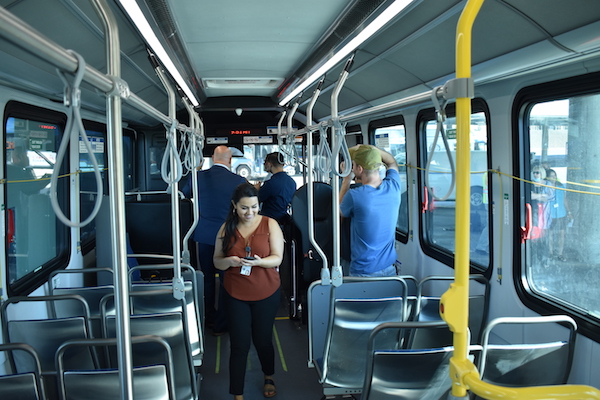
The new electric buses in Fresno cost on average $1.3 million. They will be deployed by Nov. 1. Photos by Frank Lopez
Written by Frank Lopez
Mayor Jerry Dyer held a press conference Thursday morning to announce that the city’s FAX bus system will be deploying its first electric vehicles.
City officials expect to launch two electric buses — each with an average $1.3 million price tag — on the streets of Fresno by Nov. 1.
Seven additional electric buses have been ordered for the FAX fleet and are slated to arrive in mid 2022.
Funding comes from various Federal Transit Administration grants as well as the state.

The buses will first be rolled out for passengers who take Route 38, which runs from River Park south down Cedar Avenue to Jensen Avenue then to West Fresno and downtown.
“Today we are demonstrating as a city that cleaning up our city—unifying our city, is more than just picking up litter and trash, it is also about cleaning up our air quality in Fresno,” Dyer said. “These buses are 100% electric and also have zero tail pipe emissions, so they are 100% energy friendly.”
Each bus can transport 35 passengers at one time. Dyer touted that the riders of the electric buses will get “the quietest ride that they will ever have.”
One electric takes about four hours to fully charge, providing a bus about a 180-to-195-mile range of travel per charge during summer months and possibly more during colder seasons.
City bus drivers will be trained over the next several months to properly operate the electric buses and perform new safety measures.
To support the FAX’s transition to an electric and hybrid fleet, the local infrastructure of charging stations will also be expanded.
The City of Fresno has a goal to fully transition the FAX bus fleet to be 100% electric or hydrogen fuel cell-powered.
“We will be fully transitioned to zero-emission with our bus fleet by 2040,” Dyer said.
The 20-year cost to gradually transition the bus fleet is estimated to be $264 million.
The completed fleet will consist of 67 battery electric buses, 66 hydrogen fuel cell electric buses, and 65 smaller, paratransit electric buses.
The fully electric buses will be used for less demanding routes while the fuel cell buses will be deployed to longer routes.
Brian Barr, assistant director of transportation for the City of Fresno, said that the Fresno City Council awarded a $5.7 million contract for a first phase of infrastructure improvements to provide 46 chargers at the FAX bus yard and 30 chargers for light equipment sedans used for FAX operations.
Through PG&E’s EV Fleet program, the utility will upgrade the city’s infrastructure at no cost and will provide incentives for the purchase of bus chargers and electric buses.
Later infrastructure improvements include a hydrogen fuel station at the Fresno Municipal Service Center to support the hydrogen fuel fleet.
Fresno City College has partnered with FAX and secured a grant to develop an advanced propulsion laboratory that will be a state-of-the-art facility at its west satellite campus to develop zero emission technology. The college has also partnered with the bus manufacturer working with the city.
“This is just the beginning as we move forward to zero-emission technology and transition the balance of the municipal fleet. We are ready to meet the challenges ahead,” Barr said.








